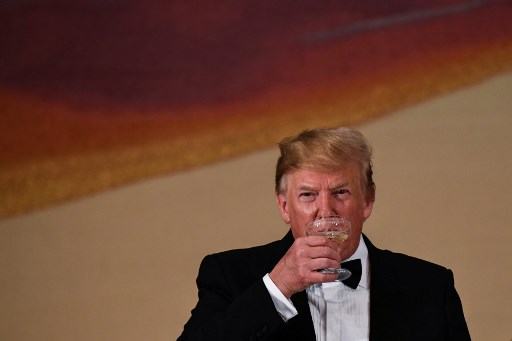TOKYO, Japan – Trump came to meet Japan’s emperor but it was the US president who played the monarch in Tokyo as he pushed a personal brand of foreign policy leaving allies, foes and staff alike wondering what on Earth to expect next.
A master of self-promotion, Trump has for decades made sure that everything he does – from building skyscrapers to running the White House – is all about him.
His diplomatic style in Japan, where he was given the honor of being the first foreign leader to meet new Emperor Naruhito, was no different.
At a joint press conference with Prime Minister Shinzo Abe on Monday, Trump took questions on some of the biggest challenges facing the United States and its close ally Japan.
Then he freewheeled.
On North Korea, he breezily dismissed worries about recent testing of short-range missiles, which both Abe and Trump’s own advisors say violated UN Security Council resolutions.
“My people think it could have been a violation…. I view it as a man who perhaps wants to get attention,” Trump said of North Korea’s leader Kim Jong Un.
US intelligence agencies also state emphatically that Kim intends to hang on to his nuclear weapons, but Trump signaled he believes his own instincts better.
He talks to Kim “a lot” about his preference for opening up North Korea to investment over amassing nuclear weapons, he said, and he finds Kim “a very smart man.”
Trump will be criticized yet again in Washington for praising a dictator but he doesn’t seem to care.
And on Iran, Trump induced even more diplomatic whiplash.
Before Trump flew to Japan, the United States had announced it was sending 1,500 extra troops to the region, adding to the aircraft carrier group and nuclear-capable bomber planes already dispatched.
Trump himself threatened “the official end” of the country if Tehran ever attacked US interests.
But Monday, Trump offered assurances that he can live with the Islamic republic’s government, whose toppling has long been a dream for Washington hardliners.
“We’re not looking for regime change,” Trump said, explaining that he only cared about Iran not achieving nuclear power status.
In fact, there was only one clear target in the president’s sights Monday: his own hawkish national security advisor John Bolton, whom Trump has repeatedly contradicted over North Korea and Iran, sitting a few feet away.
Japan tries charm
As Trump goes around the world tearing up treaties, slapping on trade tariffs and blowing hot and cold over what to do in places like Iran, different countries try different strategies.
European Union countries are divided and often confused over the upheaval in what had long been a cozy, almost family relationship with the United States.
China, with ambitions of becoming the world’s main superpower, has pushed back, triggering a trade war that shows no sign of quick resolution.
Japan has taken a different tack: flattering and befriending the unpredictable American.
Abe bent over backwards to make sure “Donald,” as he called him at their press conference, was happy throughout the visit starting Saturday.
“Because of the very close personal relationship with Donald, the bond of the US-Japan alliance has become unshakeable, the closest in the whole world,” Abe said.
He chose Trump to be the first world leader to get an audience with Naruhito, sated the US president’s famous appetite for well-cooked meat, took a joint selfie on the golf course, and promised to buy 105 F-35 warplanes.
Abe even arranged for Trump to enter Japan’s most hallowed sumo ring and present a trophy to the champion wrestler.
The trophy was meant to be from the United States, but, as Trump emphasised, it was really from him.
“We did it personally. We bought that beautiful trophy, which they’ll have, hopefully, for many hundreds of years,” Trump said.
What did Abe get in return?
Trump dialed down trade tensions, for one, announcing that any serious discussions in negotiations on his insistence that Japan open to more US products will be put off until after Abe gets through elections here in July.
“Although staying closer to Trump brings some risks, the cozy ties between the Japanese and US leaders are at least helping ease negotiations,” said Yoko Takeda, chief economist at the Mitsubishi Research Institute.
“Japan is doing the right thing.” /ee
